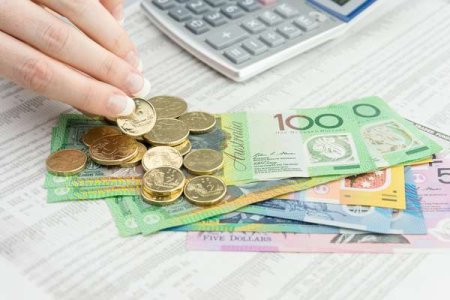Uncover 7 daily habits secretly draining your wallet—what you don't know could cost you!
- Replies 13
In the hustle and bustle of everyday life, it's easy to overlook the small expenses that slowly but surely chip away at our bank accounts.
These seemingly insignificant costs can add up over time, leaving us scratching our heads and wondering where our hard-earned money has gone.
From a daily cup of coffee to the hidden fees and charges that come with certain services, these small expenses can have a significant impact on our financial health.
Christine Lusher, a Financial Advisor at Lush Wealth, said, 'Life is busy and we all get caught up with the daily grind.'
While planned expenses have an impact on our wallets, it's crucial to be aware of these daily habits that could be costing us more than we realise.

The little things add up
Lusher recommended examining 'the little spending habits' and their influence on 'the bigger picture’.
‘Our spending is the same, habits set up a decade ago will remain unless you consciously break them,’ she said.
Alec Renehan, co-host of the Equity Mates podcast, echoed this sentiment and offered some examples.
He suggested keeping a close eye on how often you buy coffee 'rather than making it at home' and how much you spend on food delivery services like UberEATS.
He also advised 'cancelling unnecessary subscriptions'.
Lacey Filipich, founder and Director of Money School, pointed out that she ‘usually finds everyone has at least one subscription they're not really using—streaming services and gym memberships being common ones.’
Téa Angelos, founder & CEO of Smart Women Society, added, 'Small expenses may seem insignificant every day, but they can really add up over time. $13.40 a day adds up to over $5,000 in a year.'
Reconsider your living situation
Lusher also advised rethinking whether your current living situation is meeting your needs.
'Can you downsize?' she asked.
'Or can you purchase a smaller home to begin with? A smaller mortgage or rent is going to make a big difference to your cash flow.'
Big-ticket items
Lusher suggested delaying car upgrades and downgrading holidays.
Filipich also recommended that it is ‘best to look at your big ticket items that you use daily’, such as housing, energy, transport, insurance, and ‘aim to get better deals there'.
One way to manage this is to opt for renting instead of purchasing.
For example, if you're considering buying a caravan, Lusher suggests renting one instead.
‘Do you need to own one? Or could you just rent one for the six weeks you can handle being in a confined space on wheels with your partner?’ she asked.
Check your savings account interest rates
Renehan advised reviewing the interest rates offered by savings accounts.
'My rule of thumb as we enter 2024: if your savings account isn't paying at least 4 per cent, it's time to move,' he said.
'Some of the major banks are still paying 2 per cent interest on savings, while the best savings accounts are paying more than 5 per cent.'
Watch your credit card use
Sarah Megginson, Personal Finance Expert at Finder, warned about the surcharges that come with credit card use.
'Paying with a card on your phone or device, so many places charge 1-2 per cent credit card and processing fees these days, and even though cafes, bars and restaurants are legally meant to give you advance notice, many of them don't,' she said.
‘So you tap an order for $22, but it actually charges you $22.44. That may not seem like much, but multiply that fee 10 times a week, 52 weeks a year, and you're wasting hundreds of dollars.’

Reduce food waste
Jennifer Richardson, founder and Director of 123 Financial Group and Got Money Honey, urged Australians to consider how much food they are wasting each year.
'Each household wastes between $2000 and $2500 per year,' she said.
'That is the easiest way to save money without actually doing anything.'
‘Keeping raw bones or vegetable offcuts to make your own soups or stock is a great money saving idea among other things,’ she added.
Change Your Mindset
Julia Scott from Love Luck Wealth said a 'mindset focused on lack is disempowering'.
She suggested shifting the focus from 'cutting back expenses' to looking for ways to 'make more money’.
'Cut backs are demoralising and reinforce a lack mindset, which is not good for your earnings vibration,' she said.
'There's also a limit to how much you can cut, whereas your earning potential is limitless.’
‘There's always another way to make money. For example, it's a lot easier and more empowering to negotiate a $2,000 raise than cut back $2,000 in living costs. Plus, that raise continues to come to you for years to come,’ she explained.
Filipich agreed adding, 'It's only a waste if it doesn't meet an essential need or bring you satisfaction. So that depends on what you consider essential, and on what you enjoy.’
While it's important to budget for big-ticket items and planned expenses, don't overlook the smaller, everyday costs that can add up over time.
By being mindful of these expenses and making small changes to your daily habits, you can save a significant amount of money in the long run.
Remember, every dollar saved is a dollar earned. So, start paying attention to these daily habits and see how much you can save!
If you already know these tips or they did not align with your situation, you might want to check out these other tips that could save you dollars!

What are some of the daily habits you've noticed that are costing you money? Do you know other tricks on how to save some cash? Share your experiences and tips in the comments below.
These seemingly insignificant costs can add up over time, leaving us scratching our heads and wondering where our hard-earned money has gone.
From a daily cup of coffee to the hidden fees and charges that come with certain services, these small expenses can have a significant impact on our financial health.
Christine Lusher, a Financial Advisor at Lush Wealth, said, 'Life is busy and we all get caught up with the daily grind.'
While planned expenses have an impact on our wallets, it's crucial to be aware of these daily habits that could be costing us more than we realise.

Christina Lusher warned about mundane habits that could be costing us without us knowing. Credits: Shutterstock
The little things add up
Lusher recommended examining 'the little spending habits' and their influence on 'the bigger picture’.
‘Our spending is the same, habits set up a decade ago will remain unless you consciously break them,’ she said.
Alec Renehan, co-host of the Equity Mates podcast, echoed this sentiment and offered some examples.
He suggested keeping a close eye on how often you buy coffee 'rather than making it at home' and how much you spend on food delivery services like UberEATS.
He also advised 'cancelling unnecessary subscriptions'.
Lacey Filipich, founder and Director of Money School, pointed out that she ‘usually finds everyone has at least one subscription they're not really using—streaming services and gym memberships being common ones.’
Téa Angelos, founder & CEO of Smart Women Society, added, 'Small expenses may seem insignificant every day, but they can really add up over time. $13.40 a day adds up to over $5,000 in a year.'
Reconsider your living situation
Lusher also advised rethinking whether your current living situation is meeting your needs.
'Can you downsize?' she asked.
'Or can you purchase a smaller home to begin with? A smaller mortgage or rent is going to make a big difference to your cash flow.'
Big-ticket items
Lusher suggested delaying car upgrades and downgrading holidays.
Filipich also recommended that it is ‘best to look at your big ticket items that you use daily’, such as housing, energy, transport, insurance, and ‘aim to get better deals there'.
One way to manage this is to opt for renting instead of purchasing.
For example, if you're considering buying a caravan, Lusher suggests renting one instead.
‘Do you need to own one? Or could you just rent one for the six weeks you can handle being in a confined space on wheels with your partner?’ she asked.
Check your savings account interest rates
Renehan advised reviewing the interest rates offered by savings accounts.
'My rule of thumb as we enter 2024: if your savings account isn't paying at least 4 per cent, it's time to move,' he said.
'Some of the major banks are still paying 2 per cent interest on savings, while the best savings accounts are paying more than 5 per cent.'
Watch your credit card use
Sarah Megginson, Personal Finance Expert at Finder, warned about the surcharges that come with credit card use.
'Paying with a card on your phone or device, so many places charge 1-2 per cent credit card and processing fees these days, and even though cafes, bars and restaurants are legally meant to give you advance notice, many of them don't,' she said.
‘So you tap an order for $22, but it actually charges you $22.44. That may not seem like much, but multiply that fee 10 times a week, 52 weeks a year, and you're wasting hundreds of dollars.’

Credit card fees, while small, could amount to hundreds of dollars with frequent use. Credits: Shutterstock
Reduce food waste
Jennifer Richardson, founder and Director of 123 Financial Group and Got Money Honey, urged Australians to consider how much food they are wasting each year.
'Each household wastes between $2000 and $2500 per year,' she said.
'That is the easiest way to save money without actually doing anything.'
‘Keeping raw bones or vegetable offcuts to make your own soups or stock is a great money saving idea among other things,’ she added.
Change Your Mindset
Julia Scott from Love Luck Wealth said a 'mindset focused on lack is disempowering'.
She suggested shifting the focus from 'cutting back expenses' to looking for ways to 'make more money’.
'Cut backs are demoralising and reinforce a lack mindset, which is not good for your earnings vibration,' she said.
'There's also a limit to how much you can cut, whereas your earning potential is limitless.’
‘There's always another way to make money. For example, it's a lot easier and more empowering to negotiate a $2,000 raise than cut back $2,000 in living costs. Plus, that raise continues to come to you for years to come,’ she explained.
Filipich agreed adding, 'It's only a waste if it doesn't meet an essential need or bring you satisfaction. So that depends on what you consider essential, and on what you enjoy.’
While it's important to budget for big-ticket items and planned expenses, don't overlook the smaller, everyday costs that can add up over time.
By being mindful of these expenses and making small changes to your daily habits, you can save a significant amount of money in the long run.
Remember, every dollar saved is a dollar earned. So, start paying attention to these daily habits and see how much you can save!
If you already know these tips or they did not align with your situation, you might want to check out these other tips that could save you dollars!
Key Takeaways
- Reviewing everyday spending habits could reveal small regular expenses that accumulate and significantly impact budgets.
- Reducing unnecessary subscriptions, considering downsizing accommodation, and delaying large purchases could improve cash flow.
- Regularly checking savings account interest rates and switching to better deals could result in substantial savings over time.
- Instead of focusing solely on cutting back expenses, adopting a mindset of increasing income could be empowering and potentially offer greater financial benefits.
What are some of the daily habits you've noticed that are costing you money? Do you know other tricks on how to save some cash? Share your experiences and tips in the comments below.







